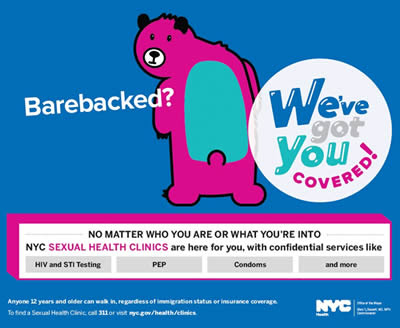NEW YORK CITY, NY, February 17, 2017 – Amid growing concerns about federal government commitments to the national HIV response, TAG applauds the New York City Department of Health and Mental Hygiene (DOHMH) for its radical expansion of the city’s sexual health clinics as hubs of HIV prevention, care, and treatment.

“Now more than ever, activism, community mobilization, and government leadership is required to end HIV as an epidemic in the United States,” said Mark Harrington, TAG’s executive director. “Ending AIDS and new HIV infections isn’t just a federal-level fight, but also a push for profoundly innovative efforts on state, county, and city levels. A remarkable example is DOHMH’s reimagining of New York City’s STD clinics as sex-positive hubs of innovative care incorporating science and evidence-based treatment and prevention strategies in addressing the epidemic among vulnerable communities.”
The move pays tribute to innovative, decades-long, and continuing efforts by activists, community leaders, public health, and government to create the 2015 which commits New York State to reduce new infections to fewer than 750 per year in the state and fewer than 600 in NYC by 2020 through a combination of science, community and political will.
Blueprint recommendations made by TAG and partners included developing STD clinics as ‘one-stop-shops’ with expanded options that provide enrollment into health insurance programs like Medicaid, referrals to behavioral health, substance use, housing programs, and access to pre-exposure prophylaxis (PrEP) and post-exposure prophylaxis (nPEP). The blueprint further recommends STD clinics as “natural places” to engage vulnerable communities since most of NYC’s infections are sexually transmitted, which points to such clinics as vital resource points to access PrEP and nPEP.
“These recommendations were finally realized in the announcement by NYC DOHMH to radically change the city’s STD clinics to mirror the Blueprint and continue to set New York on the path to end the epidemic by bringing advances in HIV prevention and treatment strategies to scale,” said Harrington.
Dr. Demetre Daskalakis, Acting Deputy Commissioner for Division of Disease Control at DOHMH, revealed details of the plan during a plenary presentation at the 2017 Conference on Retroviruses and Opportunistic Infections (CROI) in Seattle this week. Early in his talk, Dr. Daskalakis acknowledged the vision of TAG and Housing Works to end the epidemic in NYS with a science-based response and targeted changes to policy to scale up biomedical and structural interventions, with special attention to particularly vulnerable populations and eliminating stigma.
“The NYS EtE Blueprint and the NYC sexual health clinic expansion exemplifies what is possible with community leadership,” said Harrington. “In the current political climate, state and local governments and health departments will be required to step up their commitments as stakeholders in the HIV response. We look forward to strengthening and supporting community coalitions in other jurisdictions to achieve what we now know is possible.”
